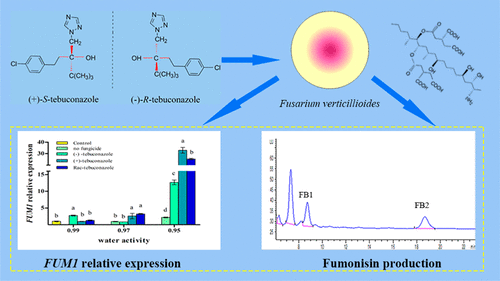当前位置:
X-MOL 学术
›
J. Agric. Food Chem.
›
论文详情
Our official English website, www.x-mol.net, welcomes your
feedback! (Note: you will need to create a separate account there.)
Effect of Tebuconazole Enantiomers and Environmental Factors on Fumonisin Accumulation and FUM Gene Expression in Fusarium verticillioides
Journal of Agricultural and Food Chemistry ( IF 5.7 ) Pub Date : 2018-11-20 00:00:00 , DOI: 10.1021/acs.jafc.8b04900 Na Li 1 , Junlong Zhao 1 , Rui Zhang 1 , Luqing Deng 1 , Jianfang Li 1 , Yan Gao 2 , Chenglan Liu 1
Journal of Agricultural and Food Chemistry ( IF 5.7 ) Pub Date : 2018-11-20 00:00:00 , DOI: 10.1021/acs.jafc.8b04900 Na Li 1 , Junlong Zhao 1 , Rui Zhang 1 , Luqing Deng 1 , Jianfang Li 1 , Yan Gao 2 , Chenglan Liu 1
Affiliation

|
Fusarium verticillioides is an important corn pathogen that can produce fumonisins (FBs) under certain environmental conditions. In this study, we evaluated the enantioselective impact of tebuconazole enantiomers on the growth and FB production of F. verticillioides on maize-based media at different abiotic factors. The expression of FB biosynthetic genes (FUM1 and FUM6) was quantified by real-time reverse transcription polymerase chain reaction. The results showed that water activity (aw), temperature, and types of tebuconazole significantly affected the growth of F. verticillioides. The order of fungicidal activity was (−)-tebuconazole > rac-tebuconazole > (+)-tebuconazole. (−)-tebuconazole exhibited the maximal selective fungicidal activity (242-fold) against F. verticillioides at 0.95 aw and 35 °C. Production of fumonisin B1 (FB1) and fumonisin B2 (FB2) by F. verticillioides was influenced by aw, temperature, types of tebuconazole, and dose. Under most conditions, (−)-tebuconazole showed stronger inhibition for FB1 and FB2 production than (+)-tebuconazole (1.87–2.85-fold reduction in FBs) and rac-tebuconazole. The optimal environmental condition for FB production was at 0.99 aw and 25 °C. Tebuconazole enantiomers differently affected FB biosynthetic gene (FUM1 and FUM6) expression, but the effects on FB production and gene expression showed no positive correlation. The present study provides a better understanding on ways to minimize FB production in corn treated with fungicides.
中文翻译:

戊唑醇对映体和环境因素对褐变镰刀菌伏马菌素积累和FUM基因表达的影响
枯萎镰刀菌是一种重要的玉米病原体,在某些环境条件下会产生伏马毒素。在这项研究中,我们评估了戊唑醇对映异构体在不同非生物因素下对玉米培养基上网状镰孢菌的生长和FB产生的对映选择性。通过实时逆转录聚合酶链反应定量FB生物合成基因(FUM1和FUM6)的表达。结果表明,水的活性(a w),温度和戊丁康唑的类型显着影响黄萎病菌的生长。杀菌活性的顺序为(-)-戊唑醇> rac-戊唑醇>(+)-戊唑醇。(-)-戊唑醇在0.95 a w和35°C下表现出最大的针对F. verticillioides的选择性杀真菌活性(242倍)。生产伏马菌素B的1(FB 1)和伏马菌素乙2(FB 2)由F.轮枝通过影响一个瓦特,温度,类型戊唑醇,和剂量。在大多数情况下,(-)-戊唑醇对FB 1和FB 2产生的抑制作用比(+)-戊唑醇(FBs降低1.87–2.85倍)和rac-戊唑醇。FB生产的最佳环境条件是0.99 a w和25°C。戊唑醇对映体对FB生物合成基因(FUM1和FUM6)表达的影响不同,但对FB产生和基因表达的影响没有正相关。本研究提供了更好的方法来减少用杀真菌剂处理过的玉米中FB的产生。
更新日期:2018-11-20
中文翻译:

戊唑醇对映体和环境因素对褐变镰刀菌伏马菌素积累和FUM基因表达的影响
枯萎镰刀菌是一种重要的玉米病原体,在某些环境条件下会产生伏马毒素。在这项研究中,我们评估了戊唑醇对映异构体在不同非生物因素下对玉米培养基上网状镰孢菌的生长和FB产生的对映选择性。通过实时逆转录聚合酶链反应定量FB生物合成基因(FUM1和FUM6)的表达。结果表明,水的活性(a w),温度和戊丁康唑的类型显着影响黄萎病菌的生长。杀菌活性的顺序为(-)-戊唑醇> rac-戊唑醇>(+)-戊唑醇。(-)-戊唑醇在0.95 a w和35°C下表现出最大的针对F. verticillioides的选择性杀真菌活性(242倍)。生产伏马菌素B的1(FB 1)和伏马菌素乙2(FB 2)由F.轮枝通过影响一个瓦特,温度,类型戊唑醇,和剂量。在大多数情况下,(-)-戊唑醇对FB 1和FB 2产生的抑制作用比(+)-戊唑醇(FBs降低1.87–2.85倍)和rac-戊唑醇。FB生产的最佳环境条件是0.99 a w和25°C。戊唑醇对映体对FB生物合成基因(FUM1和FUM6)表达的影响不同,但对FB产生和基因表达的影响没有正相关。本研究提供了更好的方法来减少用杀真菌剂处理过的玉米中FB的产生。











































 京公网安备 11010802027423号
京公网安备 11010802027423号